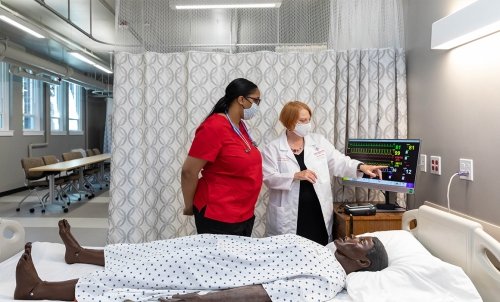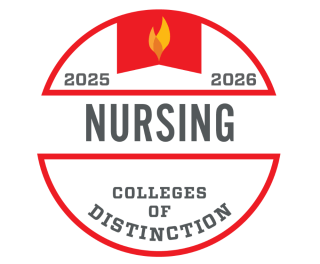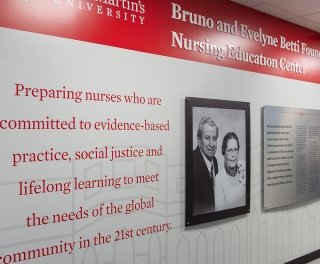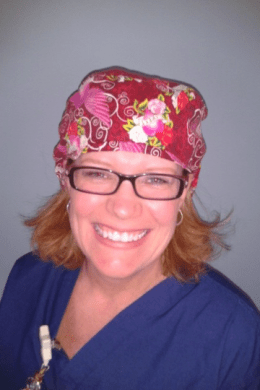
Nursing BSN
Looking for a career where you can make a positive difference in the lives of others by caring for the suffering, addressing social injustice, and helping fill the gaps in healthcare? Nursing may be the best major for you.
Jump to
Why Saint Martin's University?
Saint Martin’s is building a BSN program that will prepare nurses to practice in the 21st century.
Healthcare is dynamic and complex, therefore BSN students will develop critical thinking skills in the Saint Martin’s liberal arts core, and layer on the knowledge and skills of the rigorous nursing program to be prepared to practice in an ever-changing care environment.
To meet the challenges of preparing the 21st century nurse, Saint Martin’s has:
- A newly constructed science building, classrooms and labs for pre-requisite courses
- State-of-the-art wing dedicated to nursing studies, including a dedicated simulation lab
- Expanded labs and a new dedicated nursing classroom thanks to the Murdock grant
- Dedicated nursing student study lounge near nursing learning labs
- Clinical experiences at local acute care facilities, including Providence St. Peter’s hospital and Capital Medical Center, as well as community sites including skilled nursing facilities, schools, home health, hospice and public health.
The Bachelor of Science in Nursing (BSN) program prepares you for a career as a professional registered nurse. The coursework in the BSN program enables you to take the NCLEX-RN exam in any state in the US, and prepares you for life-long learning including graduate education. BSN graduates are prepared to work across the care continuum, in hospitals, community agencies, home health care, hospice, skilled nursing facilities, mental health facilities and more.
Saint Martin’s nursing students and BSN graduates will live out the university core values of faith, reason, service and community, by being committed to making a positive difference in the lives of others by alleviating suffering, addressing social inequities and eliminating health disparities.
Important dates for applications and admission
- Aug. 1, 2025: Application opens for first-year and transfer applications for 2026
- Feb. 10, 2026: Application deadline for first-year and transfer applications for 2026
Criteria for first-year direct admission to Nursing
First-year undergraduate Bachelor of Science in Nursing applicants must meet the general entrance requirements of the University as outlined in the university catalog and at the first-year admissions website.
Applicants seeking admission to the nursing program are required to have 3 years of high school or higher science courses, including one year of laboratory science and mathematics including college preparatory algebra, with grades of “B” (3.0) or higher.
Progression into the upper-division nursing courses are dependent on the following:
- A cumulative GPA of 3.0 or higher at the end of the second (sophomore) year at Saint Martin’s.
- A minimum cumulative GPA of 3.0 or higher in the prerequisite sciences taken at Saint Martin’s University.
- All pre-requisite courses must be passed with a grade of B or higher.
- Students may repeat one pre-requisite science course one time if they receive a grade of lower than a B.
- Satisfactory completion of all clinical entry requirements, including background clearance, drug screen and immunizations.
Transfer application and admission requirements
Transfer student applicants to the upper division of the Bachelor of Science in Nursing program must meet the transfer admission requirements of the University as outlined in the university catalog and at the Transfer (undergrad) website. Transfer applicants may state their preference for fall or spring entry into the upper-division nursing program.
Application materials needed:
- Completed Saint Martin’s application form
- Complete nursing-specific questions found on the Saint Martin’s application
- Transcripts from ALL previously attended colleges
- Resume
- Two letters of recommendation, preferably both from a current or past professor
Acceptance into the upper-division nursing program for the Bachelor of Science in Nursing degree is dependent on the following:
- A cumulative GPA of 3.0 or above. Transfer student GPA is computed from all college-level coursework taken.
- A minimum of 3.0 GPA in all required prerequisite science courses.
- Completion of all nursing prerequisite courses. Prerequisite courses may be taken at any accredited college or university.
- Students may repeat one prerequisite science course one time if they receive a grade of lower than a B.
- Satisfactory completion of all clinical entry requirements, including background clearance, drug screen and immunizations.
- American Heart Association Provider Basic Life Support required before nursing clinical classes start.
- Transfer applications to the BSN program are due Feb. 10. Students will be notified of admission, wait list or denial for the BSN program in March.
Internal transfers
Current Saint Martin’s student requests for internal transfer to the nursing major will be considered on a space available basis. Qualified applicants who wish to change their major to nursing must meet the freshman admission criteria outlined above and have a cumulative 3.0 GPA or higher in courses taken at Saint Martin’s. Students wishing to transfer to the BSN major must meet with the Director of Nursing to apply for transfer into the major and to develop a plan of study.
Nursing BSN Requirements
All nursing students must meet the Technical Standards of the nursing program, with or without reasonable accommodation to successfully complete the nursing program. Students interested in applying to the nursing program are encouraged to review the Technical Standards to be familiar with the performance abilities required to be successful in a clinically based nursing program.
- BIO 141: Biology with lab
- BIO 228/328: Human Anatomy & Physiology I with lab
- BIO 229/329: Human Anatomy & Physiology II with lab
- BIO 251: Microbiology for Applied Health with lab
- CHM 121: Introduction to Chemistry with lab
- MTH 101: Intermediate Algebra (may be waived if student tests into higher level math)
- MTH 201: Introduction to Statistics
- NUR/EXS 203: Human Nutrition
- PSY 215: Lifespan Development
The curriculum plan for the traditional four-year student who does not have a registered nurse license is as follows:
First year
- COR 100: First year Seminar (4)
- COR 110: Religious Studies (3)
- COR 120: Critical Reasoning and Writing (4)
- CHM 121: Introduction to Chemistry and lab (4)
- BIO 141: General Biology and lab (4)
- MTH 101: Intermediate Algebra (3)
- NUR 100: Introduction to Nursing (3)
- Electives (3 credits)
Second year
- BIO 228: Human Anatomy & Physiology I and lab (4)
- BIO 229: Human Anatomy & Physiology II and lab (4)
- BIO 251: Microbiology for Applied Health with Laboratory (4)
- PSY 215: Lifespan Development (4)
- MTH 201: Introduction to Statistics (3)
- NUR 203: Human Nutrition (3)
- COR 210: Humanities (4)
- COR 240: Artistic and Creative Expression (3)
- COR 250: Historical and Political Studies (3)
Upper-division Nursing courses
Junior 1 semester
- NUR 301: Introduction to Professional Nursing (2)
- NUR 302: Foundations of Nursing Practice: Prevention and Promotion of Health (3)
- NUR 302L: Foundations of Nursing Practice Lab (2)
- NUR 302C: Foundations of Nursing Practice Clinical (1)
- NUR 303: Health Assessment (3)
- NUR 304: Pathophysiology and Pharmacology for Nursing Practice (4)
- 300 level Core class (3)
Junior II semester
- NUR 350: Translating Research into Evidence Based Practice (3)
- NUR 311: Nursing Management of Chronic Diseases (4)
- NUR 312: Nursing Management of Chronic Disease Practicum (3)
- NUR 313: Nursing Skills and Simulation Lab (2)
- COR 340W: Ethics, Human Dignity, and Reason (4) (required for nursing)
Senior I semester
- NUR 310: Health Policy (3)
- NUR 401: Nursing Management of Acute or Complex Conditions (4)
- NUR 402: Nursing Management of Acute or Complex Conditions Practicum (4)
- NUR 403: Advanced Nursing Skills and Simulation Lab (2)
- NUR 420: Nursing Management of Childbearing Families (2)
- NUR 424: Nursing Management of Childrearing Families (2)
Senior II semester
- NUR 430: Nursing Leadership (3)
- NUR 410: Promoting Population Health in the Community (3)
- NUR 412: Promoting Population Health in the Community Practicum (2)
- NUR 495: Transition to Professional Nursing Practice (2)
- NUR 499: Capstone (2)
- NUR 499C: Synthesis Clinical Practicum (3)
Course sequencing for Running Start first year students (Running Start students with a DTA progress to the upper division Nursing in their second year):
First year
Fall semester
- COR 100: First year Seminar (4)
- COR 110: Religious Studies (3)
- NUR 100: Introduction to Nursing (3)
- Electives (3 credits)
Spring semester
- COR 340W: Ethics, Human Dignity, and Reason (4)
- NUR 310: Health Policy (3)
- Elective (3-4)
- Elective (3-4)
Upper-division Nursing courses
Junior I semester
- NUR 301: Introduction to Professional Nursing (2)
- NUR 302: Foundations of Nursing Practice: Prevention and Promotion of Health (3)
- NUR 302L: Foundations of Nursing Practice Lab (2)
- NUR 302C: Foundations of Nursing Practice Clinical (1)
- NUR 303: Health Assessment (3)
- NUR 304: Pathophysiology and Pharmacology for Nursing Practice (4)
- 300 level Core class (3)
Junior II semester
- NUR 350: Translating Research into Evidence Based Practice (3)
- NUR 311: Nursing Management of Chronic Diseases (4)
- NUR 312: Nursing Management of Chronic Disease Practicum (3)
- NUR 313: Nursing Skills and Simulation Lab (2)
- COR 340W: Ethics, Human Dignity, and Reason (4) (required for nursing)
Senior I semester
- NUR 310: Health Policy (3)
- NUR 401: Nursing Management of Acute or Complex Conditions (4)
- NUR 402: Nursing Management of Acute or Complex Conditions Practicum (4)
- NUR 403: Advanced Nursing Skills and Simulation Lab (2)
- NUR 420: Nursing Management of Childbearing Families (2)
- NUR 424: Nursing Management of Childrearing Families (2)
Senior II semester
- NUR 430: Nursing Leadership (3)
- NUR 410: Promoting Population Health in the Community (3)
- NUR 412: Promoting Population Health in the Community Practicum (2)
- NUR 495: Transition to Professional Nursing Practice (2)
- NUR 499: Capstone (2)
- NUR 499C: Synthesis Clinical Practicum (3)
The curriculum plan for the transfer student who does not have a registered nurse license includes meeting the core curriculum and upper-division nursing courses. Students with a Direct Transfer Agreement will take COR 110 Religious Studies and the upper-division nursing courses.
Upper-division Nursing courses
Junior 1 semester
- NUR 301: Introduction to Professional Nursing (2)
- NUR 302: Foundations of Nursing Practice: Prevention and Promotion of Health (3)
- NUR 302L: Foundations of Nursing Practice Lab (2)
- NUR 302C: Foundations of Nursing Practice Clinical (1)
- NUR 303: Health Assessment (3)
- NUR 304: Pathophysiology and Pharmacology for Nursing Practice (4)
- COR 110: Religious Studies (3)
Junior II semester
- NUR 350: Translating Research into Evidence Based Practice (3)
- NUR 311: Nursing Management of Chronic Diseases (4)
- NUR 312: Nursing Management of Chronic Disease Practicum (3)
- NUR 313: Nursing Skills and Simulation Lab (2)
- COR 340W: Ethics, Human Dignity, and Reason (4) (required for nursing)
Senior I semester
- NUR 310: Health Policy (3)
- NUR 401: Nursing Management of Acute or Complex Conditions (4)
- NUR 402: Nursing Management of Acute or Complex Conditions Practicum (4)
- NUR 403: Advanced Nursing Skills and Simulation Lab (2)
- NUR 420: Nursing Management of Childbearing Families (2)
- NUR 424: Nursing Management of Childrearing Families (2)
Senior II semester
- NUR 430: Nursing Leadership (3)
- NUR 410: Promoting Population Health in the Community (3)
- NUR 412: Promoting Population Health in the Community Practicum (2)
- NUR 495: Transition to Professional Nursing Practice (2)
- NUR 499: Capstone (2)
- NUR 499C: Synthesis Clinical Practicum (3)
AMERICAN ASSOCIATION OF COLLEGES OF NURSING (AACN) SCHOLARSHIPS
The American Association of College of Nursing maintains a database of scholarships, grants and loan forgiveness programs that are specific to nursing.
View scholarships and financial aid opportunities from AACN
HEALTH RESOURCES & SERVICES ADMINISTRATION NURSE CORPS SCHOLARSHIPS
As a student accepted or enrolled in a diploma, associate, baccalaureate, or graduate degree nursing program, you can receive funding for tuition, fees, and other educational costs. In exchange, you must work at an eligible facility with a critical shortage of nurses—a Critical Shortage Facility (CSF)—upon graduation.
Award
We give funding preference depending on your financial need.
Eligibility
You must be:
- a U.S. citizen (born or naturalized), a national, or a lawful permanent resident;
- enrolled—or accepted for enrollment—in a professional nursing degree program at an accredited school of nursing in the U.S.;
- beginning classes no later than September 30;
- free from any federal judgment liens;
- free from an existing service commitment;
- not overdue on a federal debt.
Apply for the Nurse Corps Scholarship Program
NATIVE HAWAIIAN HEALTH SCHOLARSHIP
The Native Hawaiian Health Scholarship Program (NHHSP) addresses access to health care by developing a Native Hawaiian health care workforce of professionals committed to serve the unique health needs of Hawaiian communities. The program recruits and nurtures professionals in-training for primary health care disciplines and specialties most needed to deliver quality, culturally competent health services to Native Hawaiians throughout the State of Hawai‘i.
The merit-based program awards generous scholarships to eligible individuals that appear to be dedicated to providing primary health services to Native Hawaiians and their families in Hawai‘i.
Apply for the Native Hawaiian Health Scholarship
NURSING FUND SCHOLARSHIP
Nursing scholarship funds are set aside each year to assist students with nursing school finances.
Eligibility
To be eligible for an award, a student must be in good academic standing in the RN-BSN or BSN program.
Apply for the Nursing Fund Scholarship
PIERCE COUNTY NURSES ASSOCIATION SCHOLARSHIP
PCNA offers four different types of scholarships to nursing students. Scholarship funds are sent directly to the accredited school.
Eligibility
PCNA scholarships are available to students living or attending school in Pierce County as well as within our expanded jurisdictional boundaries of Thurston, Kitsap, Grays Harbor, Mason, Clallam and Jefferson counties.
Apply for the Pierce County Nurses Association Scholarship
PROVIDENCE SAINT PETER FOUNDATION SCHOLARSHIP
The Providence Foundation scholarship is from the Foundation’s Greatest Need Fund.
Amount
Amount of the awards are based on a combination of need (FAFSA) and overall potential contribution to the nursing profession.
Eligibility
To be eligible for an award, students must meet employment criteria at Providence Southwest Region, submit an essay addressing specified criteria, and be enrolled, at least half-time as a student in Saint Martin’s University RNBSN program, and be in good standing in the program.
Apply for the Providence Saint Peter Foundation Scholarship
WASHINGTON STATE NURSES FOUNDATION SCHOLARSHIP
The Washington State Nurses Foundation (WSNF) awards scholarships annually to qualified students who meet the eligibility requirements as outlined on the application website.
Amount
The minimum amount of each scholarship is $1,000.
Apply for the Washington State Nurses Foundation Scholarship
Nursing BSN at a Glance
- Degree
- Bachelor of Science in Nursing
- Program Type
- Major
- Campus
- Main (Lacey)
- Type of Instruction
- In Person
- Resources
- Nursing programs

 Academic Excellence
Academic Excellence
 Community
Community







